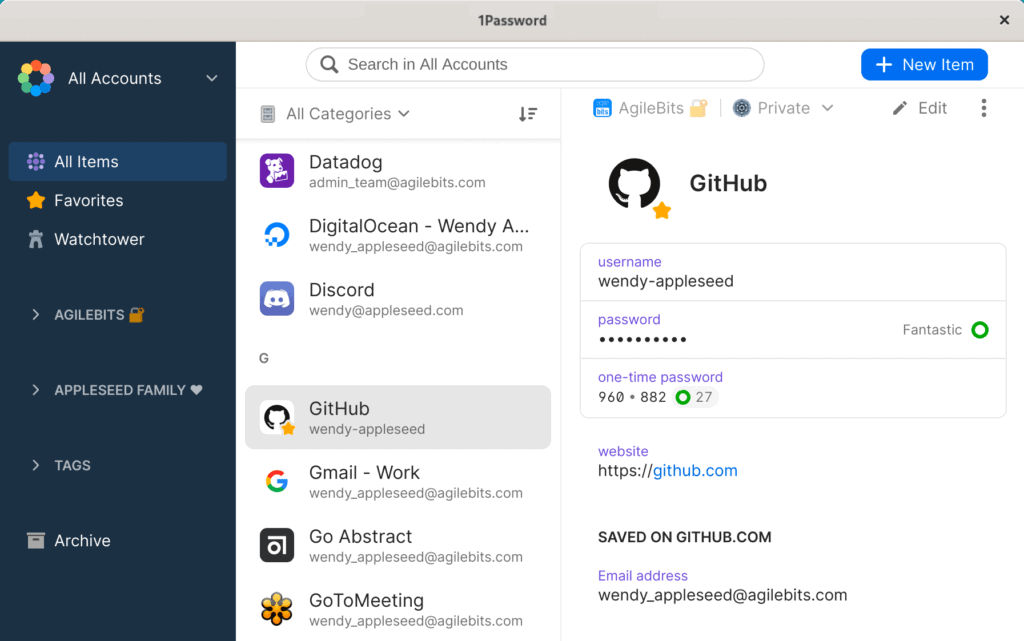Today’s news puts Linux on an equal footing to its Windows and Mac counterparts, giving all Linux users access to their 1Password-hosted data anywhere, regardless of whether they are online or not.
1Password is one of the password managers best known. Until a while ago it was available for several operating systems and to integrate in different web browsers, on the other hand, it was not ready for Linux natively. After some time in the Beta phase, since last year, it has now been launched in a totally stable way.
The app is written completely in Rust, a secure systems programming language that has seen widespread adoption in the enterprise, and is under consideration as the official language for the Linux kernel. The ring crypto library powers end-to-end encryption to keep data safe.
What makes this release even more amazing is it was created from scratch and developed using new languages and techniques most of our team never used before.
Dave Teare, co-founder of 1password

Because 1Password for Linux uses the same authentication mechanisms and APIs provided to all user applications, you can unlock 1Password with your Linux user account, fingerprint sensors, or any other authentication mechanism supported by PAM. The app uses the Linux kernel keyring to establish a fully encrypted connection between 1Password in your browser and 1Password for Linux. That means that if you unlock one, the other will also be unlocked when you switch to it.
The app will work with most modern web browsers, such as Mozilla Firefox, Google Chrome, and other Chromium-based options.
1Password’s standard edition for individuals and teams costs $3.99 per month. If you pay for a year at a time, it costs $35.88 per year, which is $2.99 per month. Business accounts start at $7.99 a month per user.
How to install 1Password desktop app on Linux
The app is available for all major Linux distributions via signed packages and app stores like Ubuntu’s Snap Store. It’s also compatible with virtually all other distributions through a standard .tar.gz download.
Debian / Ubuntu
You can download and install the .deb package to get 1Password or:
Add the key for the 1Password apt repository:
curl -sS https://downloads.1password.com/linux/keys/1password.asc | sudo gpg --dearmor --output /usr/share/keyrings/1password-archive-keyring.gpg Code language: JavaScript (javascript)Add the 1Password apt repository:
echo 'deb [arch=amd64 signed-by=/usr/share/keyrings/1password-archive-keyring.gpg] https://downloads.1password.com/linux/debian/amd64 stable main' | sudo tee /etc/apt/sources.list.d/1password.list Code language: PHP (php)Add the debsig-verify policy:
sudo mkdir -p /etc/debsig/policies/AC2D62742012EA22/
curl -sS https://downloads.1password.com/linux/debian/debsig/1password.pol | sudo tee /etc/debsig/policies/AC2D62742012EA22/1password.pol
sudo mkdir -p /usr/share/debsig/keyrings/AC2D62742012EA22
curl -sS https://downloads.1password.com/linux/keys/1password.asc | sudo gpg --dearmor --output /usr/share/debsig/keyrings/AC2D62742012EA22/debsig.gpg Code language: JavaScript (javascript)Install 1Password:
sudo apt update && sudo apt install 1passwordFedora
You can download and install the .rpm package or:
Add the key for the 1Password yum repository:
sudo rpm --import https://downloads.1password.com/linux/keys/1password.ascCode language: JavaScript (javascript)Add the 1Password yum repository:
sudo sh -c 'echo -e "[1password]\nname=1Password Stable Channel\nbaseurl=https://downloads.1password.com/linux/rpm/stable/\$basearch\nenabled=1\ngpgcheck=1\nrepo_gpgcheck=1\ngpgkey=\"https://downloads.1password.com/linux/keys/1password.asc\"" > /etc/yum.repos.d/1password.repo' Code language: JavaScript (javascript)Install 1Password:
sudo dnf install 1passwordArch Linux
Install 1Password from the Arch User Repository (AUR):
yay -S 1passwordOther
You can also download 1Password as a .tar.gz file to use on other distributions.
Download 1Password:
curl -sSO https://downloads.1password.com/linux/tar/stable/x86_64/1password-latest.tar.gz Code language: JavaScript (javascript)Extract and move the files:
tar -xf 1password-latest.tar.gz
sudo mkdir -p /opt/1Password
sudo mv 1password-<em>/</em> /opt/1PasswordCode language: JavaScript (javascript)Run the installation script:
sudo /opt/1Password/after-install.sh